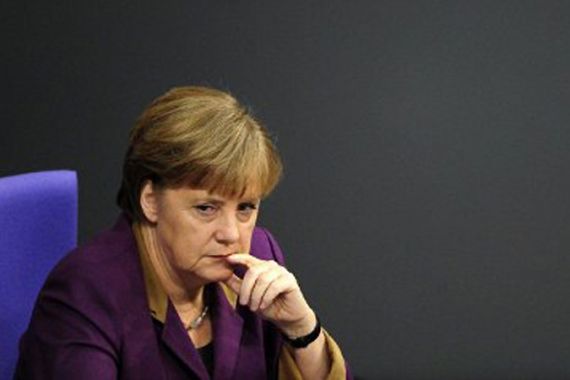German MPs approve second Greek bailout
Move comes despite domestic pressure on Chancellor Merkel to stop funding Greece and other indebted eurozone economies.

 |
| Deputies approved eurozone deal to hand Athens another €130bn ahead of key EU summit to ratify the package [EPA] |
German Chancellor Angela Merkel has managed to get a second Greek bailout approved in parliament without having to rely on the votes of opposition legislators, but she fell short of the wide majority needed for a convincing victory.
Monday’s motion passed easily, with 496 of the 591 members of the Bundestag (lower house) present in the chamber approving the 130-bn-euro ($175bn) Greek aid programme ahead of a key EU summit later this week.
|
“The risks of turning away from Greece now are incalculable” Angela Merkel, German chancellor |
While the ruling centre-right coalition managed a majority with 304 votes in favour, it did not manage the 311 votes Merkel needed for a strong margin of victory – a largely symbolic threshold known as a “chancellor’s majority”.
With the main centre-left opposition in favour of the Greek package, there were 90 ‘No’ votes and five abstentions.
Al Jazeera’s Nick Spicer, reporting from Berlin, said there is “a big disconnect between the politicians and the people”.
“The front page of Germany’s best-selling Bild newspaper says they do not want any more bailouts for Greece, and polls show that two-thirds of Germans agree with that sentiment,” he said.
Berlin provides the majority of the eurozone’s emergency funds.
Merkel is caught between pressure at home to stop giving money to the bailout fund, while facing calls from abroad to work harder at boosting Europe’s crisis defences.
Greece’s growing unpopularity
Some MPs from Merkel’s centre-right coalition have become increasingly critical of efforts to keep Greece in the eurozone and one of her own cabinet ministers said this weekend Greece’s chances of recovery would be greater outside the currency zone.
However, Merkel told parliament before the vote that it would be “reckless” of her to expose Germany – and the eurozone and wider world – to the unknown consequences of a Greek default.
| In Depth | |||||||||||||||
|
“The risks of turning away from Greece now are incalculable,” Merkel told the 591 legislators of the Bundestag lower house who had gathered for a special session to vote on the Greek package.
“No-one can assess what consequences would arise for the German economy, on Italy, Spain, the eurozone as a whole and finally for the whole world” of a Greek bankruptcy, she added.
Merkel said Greece faced a path ahead that was long and not without risk, adding: “That goes also for the success of the new programme. Nobody can give a 100-per cent guarantee of success.”
Germany, Europe’s biggest economy and effective paymaster, came under renewed pressure at a G20 weekend gathering in Mexico to agree a bolstering of the eurozone’s defence funds to 750bn euros ($975bn).
Berlin believes that with calmer market conditions and lower bond yields for Spain and Italy, the risk of debt criis contagion is lower and the pressure to bolster the zone’s defences has lessened.
“The government sees at present no necessity for a debate on the increase of the capacity” of the eurozone’s current and future bailout funds, Merkel told parliament.
But she said it would first be necessary to see the results of a Greek operation to write-down nearly a third of its debt before making a final decision on the issue.
Under a plan hammered out by eurozone finance ministers, Greece would receive up to 130bn euros ($175bn) in direct loans by 2014 in return for tough new austerity measures and tighter EU-IMF oversight of its economy.
A private creditor bond writedown is worth another 107bn euros ($142bn).